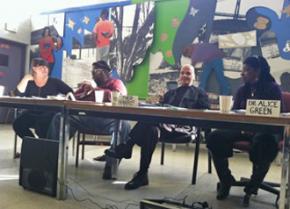The shame of our nation
reports on the fight against the racist injustice system in the Hudson Valley.
OVER 120 activists came together on November 17 for "Mass Incarceration: The Shame of Our Nation," a one-day conference in Poughkeepsie, N.Y., about fighting the New Jim Crow.
The conference was hosted by the End the New Jim Crow Action Network (ENJAN), and was endorsed and co-sponsored by several activist organizations, including the Dutchess Peace Coalition, Middle East Crisis Response, Peace Action N.Y., Young Democratic Socialist Club of Vassar, the Vassar Prison Initiative, the International Socialist Organization, Jobs Not Jails, Occupy Poughkeepsie, and the Vassar Grassroots Alliance for Alternative Politics (GAAP), among others.
The conference wrapped up a three-day schedule of events with screenings of the documentary film Hip Hop Is Bigger than the Occupation, made by the activist group Existence is Resistance--it showed on Thursday night at Vassar College and on Friday night at the Family Partnership Center, a community center in downtown Poughkeepsie.
The film documents the experiences of a group of international hip hop artists as they travel though the West Bank area of Palestine, teaching music and dance workshops to youth while witnessing the dire circumstances of the Israeli occupation.

Activists hoped to use the film screenings to draw in a broader audience for the conference, while illustrating the connections between mass incarceration at home with U.S. support for the colonial occupation of Palestine by Israel. Indeed, these connections were made all the more immediately relevant by the concurrent Israeli air assault on Gaza City, aptly described by Noam Chomsky as "the world largest open air prison."
The Hudson Valley area is home to at least 13 large-scale state prisons, housing tens of thousands of individuals, in addition to federal facilities and numerous county and municipal jails. New York state has the fourth-largest state prison population in the U.S., with over 60 state facilities and an overwhelming concentration within 100 miles of Poughkeepsie.
The area's economy, long battered by the closing of factories and the offshoring of jobs by companies like IBM and a concurrent decline in large-scale agricultural production, has seen one area of job growth: the construction and staffing of prisons. Indeed, between 1817 and 1981, the state of New York built 33 prisons; from 1982 until 2000, it built 38 full-scale facilities, not including annexes and expansions.
This ballooning of prison building mirrors national trends, which coincide with the Reagan-era intensification of the "war on drugs." In New York, the drug war was pioneered and codified by the Rockefeller laws that imposed draconian mandatory sentences for possession of even tiny amounts of illegal drugs.
The war on drugs primarily targets Black and Latino populations: In New York state, African Americans and Latinos make up nearly a quarter of the population, yet are 83 percent of the state inmate population and almost 95 percent of drug offenders. This legacy of racism and mass incarceration helps explain both the emergence locally of a group like ENJAN and the interest in the group's first public conference.
THE CONFERENCE kicked off November 17 with a statement against the Israeli air assault on Gaza read by Brian Kelley on behalf of ENJAN, followed by a panel discussion featuring Theo Harris, a formerly incarcerated activist and author; Ernest Henry, a social worker focused on re-entry issues; and radio host and Dr. Alice Green, a noted criminal justice activist and author.
The panel discussed a wide range of issues surrounding incarceration, including budget cuts to programs that help released prisoners find work and readjust, and of course, the harrowing individual experience of incarceration itself. The discussion was strongest, however, when it focused on the systemic nature of incarceration in the U.S. and its historic context.
As ENJAN member Mary Spriggs noted, "It's important to hear the stories of individual people's experience with incarceration, but we came here today to talk about the system--that it's a system-wide problem, and that's what we're talking about here."
Dr. Green made it clear when she noted, "It's important to understand the difference between incarceration, which is an individual issue, and mass incarceration which is a social issue."
Following the panel was a "Know Your Rights" workshop with the National Lawyers Guild and a meet-and-greet luncheon so activists could network and get to know one another. Next up was a fantastic performance workshop by the Bronx-based Youth Leadership Academy, a youth performance and education group. One especially powerful sketch depicted a family dealing with the stress of having a family member incarcerated, and how that might affect the next generation.
As the day wrapped up, conference attendees grabbed some signs and organized a spirited march to the nearby Dutchess County Jail. Chants like "Money for jobs and education, not for mass incarceration!" were met with honks of approval and friendly waves from passerby.
Overall, the three days of events represented a huge step forward for ENJAN and the fight against the racist system of mass incarceration. The fight to end the New Jim Crow is of crucial importance to the Hudson Valley region. The conference helped raise the profile of the issue locally, but also emphasized the need for coordinated action in building a movement to put an end to a system of mass incarceration.


